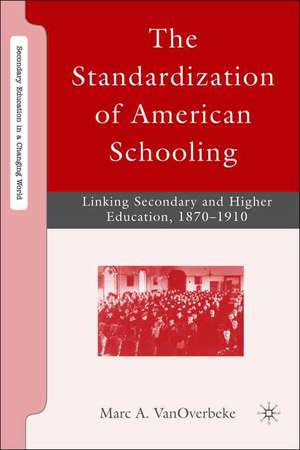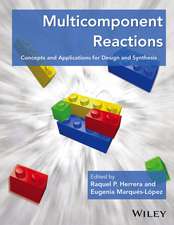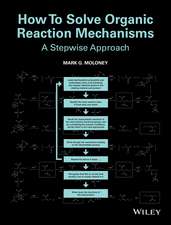The Standardization of American Schooling: Linking Secondary and Higher Education, 1870–1910: Secondary Education in a Changing World
Autor M. VanOverbekeen Limba Engleză Hardback – 15 mai 2008
| Toate formatele și edițiile | Preț | Express |
|---|---|---|
| Paperback (1) | 297.11 lei 3-5 săpt. | |
| Palgrave Macmillan US – 15 mai 2008 | 297.11 lei 3-5 săpt. | |
| Hardback (1) | 301.28 lei 3-5 săpt. | |
| Palgrave Macmillan US – 15 mai 2008 | 301.28 lei 3-5 săpt. |
Preț: 301.28 lei
Nou
Puncte Express: 452
Preț estimativ în valută:
57.68€ • 60.18$ • 48.35£
57.68€ • 60.18$ • 48.35£
Carte disponibilă
Livrare economică 19 februarie-05 martie
Preluare comenzi: 021 569.72.76
Specificații
ISBN-13: 9780230606289
ISBN-10: 0230606288
Pagini: 224
Ilustrații: XIV, 224 p.
Dimensiuni: 140 x 216 x 17 mm
Greutate: 0.37 kg
Ediția:2008
Editura: Palgrave Macmillan US
Colecția Palgrave Macmillan
Seria Secondary Education in a Changing World
Locul publicării:New York, United States
ISBN-10: 0230606288
Pagini: 224
Ilustrații: XIV, 224 p.
Dimensiuni: 140 x 216 x 17 mm
Greutate: 0.37 kg
Ediția:2008
Editura: Palgrave Macmillan US
Colecția Palgrave Macmillan
Seria Secondary Education in a Changing World
Locul publicării:New York, United States
Cuprins
Introduction * Changing Expectations for American Education * Building the University of Michigan on a High School Foundation * Michigan Launches a Movement for Regional Accreditation * The Secondary Schools' Challenge to Higher Education and the Dominance of the Modern Subjects * Charles W. Eliot and the Early Campaign for a National Education System * Regional Efforts and a Renewed Focus on National Reform * Epilogue-Looking Ahead by Looking to the Past
Recenzii
"Provides fresh, new insights into the development not only of high schools but also colleges and universities in this era.VanOverbeke s book makes a valuable and important contribution to the field. It deserves a wide readership." - Jeffrey Mirel, History of Education Quarterly
"In 1870, few college students had attended high schools, and the two institutions were rivals more than complements of one another. But in 1910 four years of high school had become the standard prerequisite for higher education. This momentous transformation is the subject of VanOverbeke s lucid and thorough study. He has admirably captured the interplay of the ideas and aspirations for articulating these two institutions against the hard realities of schools and colleges during a generation of breathtaking change." - Roger Geiger, Distinguished Professor of Education, Pennsylvania State University
"In this imaginative and groundbreaking study, VanOverbeke demonstrates how national systems of secondary and collegiate education were formed in tandem during the latter nineteenth and early twentieth centuries. Starting with the efforts of a few visionary university leaders, it was a process that led eventually to the formation of the College Board, with assistance from the Carnegie Foundation. With scrupulous historical scholarship and an engaging narrative style, VanOverbeke describes the people and events that contributed to this outcome, one that was neither preordained nor inevitable. It is a fine contribution to the historical literature on both secondary and collegiate education during this period." - John L Rury, Professor of Education and History, University of Kansas
"On the level of theory, VanOverbeke has demonstrated that for the 1870-1910 period, changes in education may be understood through an analysis of the conflict of interests between secondary schools and universities. He has also demonstrated that the curriculum must be understood within a particular timeframe and setting. In terms of specific content, the importance of his work and this period are rejected in the fact that one hundred years later, the university has been well established as the apex of the educational system and that what were once emerging regional accreditation associations are equally well established." - H-Net Reviews
"In 1870, few college students had attended high schools, and the two institutions were rivals more than complements of one another. But in 1910 four years of high school had become the standard prerequisite for higher education. This momentous transformation is the subject of VanOverbeke s lucid and thorough study. He has admirably captured the interplay of the ideas and aspirations for articulating these two institutions against the hard realities of schools and colleges during a generation of breathtaking change." - Roger Geiger, Distinguished Professor of Education, Pennsylvania State University
"In this imaginative and groundbreaking study, VanOverbeke demonstrates how national systems of secondary and collegiate education were formed in tandem during the latter nineteenth and early twentieth centuries. Starting with the efforts of a few visionary university leaders, it was a process that led eventually to the formation of the College Board, with assistance from the Carnegie Foundation. With scrupulous historical scholarship and an engaging narrative style, VanOverbeke describes the people and events that contributed to this outcome, one that was neither preordained nor inevitable. It is a fine contribution to the historical literature on both secondary and collegiate education during this period." - John L Rury, Professor of Education and History, University of Kansas
"On the level of theory, VanOverbeke has demonstrated that for the 1870-1910 period, changes in education may be understood through an analysis of the conflict of interests between secondary schools and universities. He has also demonstrated that the curriculum must be understood within a particular timeframe and setting. In terms of specific content, the importance of his work and this period are rejected in the fact that one hundred years later, the university has been well established as the apex of the educational system and that what were once emerging regional accreditation associations are equally well established." - H-Net Reviews
Notă biografică
Marc A. VanOverbeke is Assistant Professor; Department of Leadership, Educational Psychology, and Foundations; College of Education; Northern Illinois University.























